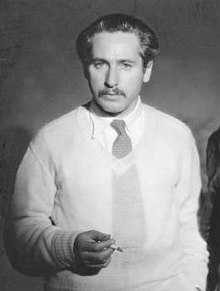
Back Josef von Sternberg AN جوسيف فون ستيرنبيرغ Arabic جوسيف فون ستيرنبيرج ARZ Йозеф фон Щернберг Bulgarian ইয়োজেফ ফন স্টার্নবের্গ Bengali/Bangla Josef von Sternberg Catalan Josef von Sternberg Czech Josef von Sternberg Danish Josef von Sternberg German Γιόζεφ φον Στέρνμπεργκ Greek
Josef von Sternberg | |
|---|---|
 Josef von Sternberg on the set of Dishonored in 1931 | |
| Born | Jonas Sternberg May 29, 1894 Vienna, Austria-Hungary (present-day Austria) |
| Died | December 22, 1969 (aged 75) Los Angeles, California, U.S. |
| Years active | 1925–1957 |
| Spouses | Riza Royce
(m. 1926; div. 1930)Jean Annette McBride
(m. 1945; div. 1947)Meri Otis Wilner (m. 1948) |
| Children | Nicholas Josef von Sternberg |
Josef von Sternberg (German: [ˈjoːzɛf fɔn ˈʃtɛʁnbɛʁk]; born Jonas Sternberg; May 29, 1894 – December 22, 1969) was an Austrian-born filmmaker whose career successfully spanned the transition from the silent to the sound era, during which he worked with most of the major Hollywood studios. He is best known for his film collaboration with actress Marlene Dietrich in the 1930s, including the highly regarded Paramount/UFA production The Blue Angel (1930).[1]
Sternberg's finest works are noteworthy for their striking pictorial compositions, dense décor, chiaroscuro illumination, and relentless camera motion, endowing the scenes with emotional intensity.[2] He is also credited with having initiated the gangster film genre with his silent era movie Underworld (1927).[3][4] Sternberg's themes typically offer the spectacle of an individual's desperate struggle to maintain their personal integrity as they sacrifice themselves for lust or love.[5]
He was nominated for the Academy Award for Best Director for Morocco (1930) and Shanghai Express (1932).[6]
Shortly before his death in 1969, his autobiography, Fun in a Chinese Laundry, was published.
- ^ Sarris, 1998. P. 219
- ^ Sarris, 1966. P. 8: "The colorful costumes, the dazzling decors, the marble-pillared palaces ..." and p. 6: "His purpose is to reveal the emotional significance of a subject by a series of magnificent canvasses." And Sternberg "relies on long, elaborate shots, each of which is developed internally – by camera movement and dramatic lighting [producing] the effect of emotional percussion." (Sarris quoting Aeneas MacKenzie)
- ^ Weinberg, 1967. P. 34: "... the genre it so eloquently established started a vogue that lasted an entire generation until the outbreak of the Second World War ..."
- ^ Sarris, 1966. P. 15: "... the first in a tradition" of the [gangster] genre.
- ^ Sarris, 1966. P. 54: Themes involve "the spectacle of man's dignity and honor crumbling before the assault of desire" bound up with adoration of a woman "which obliterate reason, honor, [and] dignity" and p. 34: the "dilemmas of desire"
- ^ Sarris, 1998. p. 499
© MMXXIII Rich X Search. We shall prevail. All rights reserved. Rich X Search